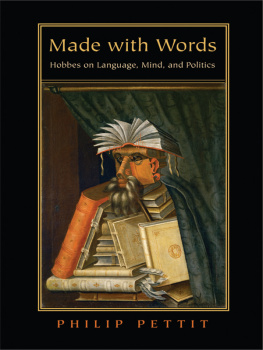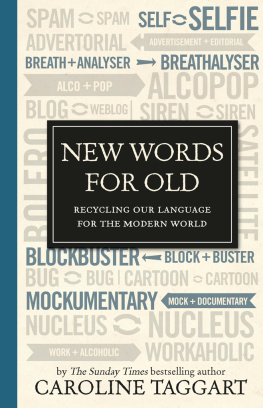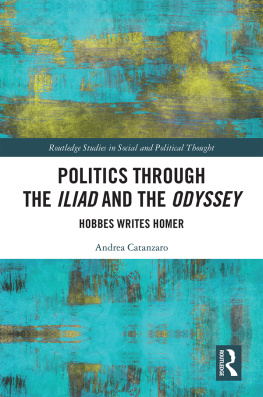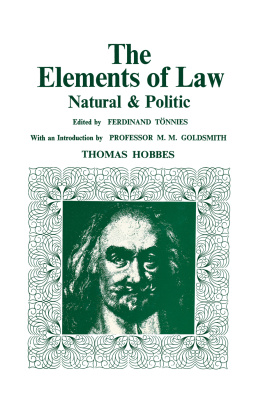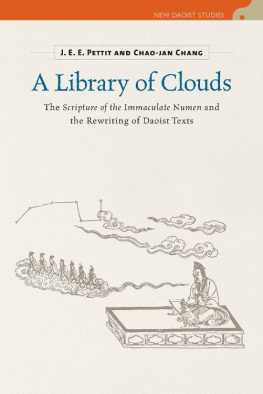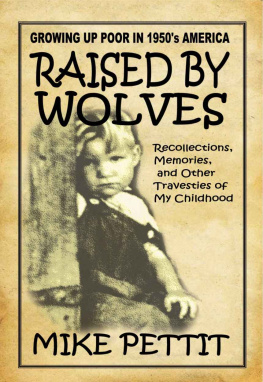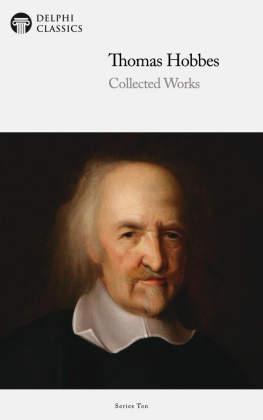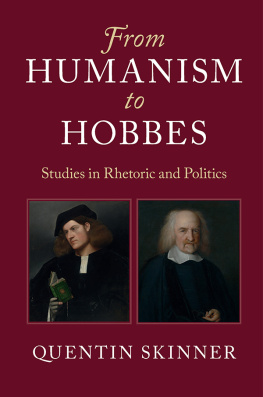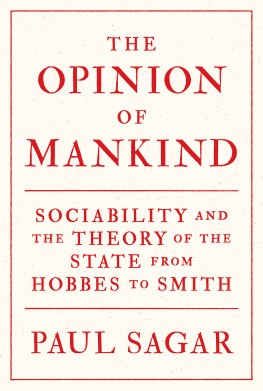Pettit - Made with Words: Hobbes on Language, Mind, and Politics
Here you can read online Pettit - Made with Words: Hobbes on Language, Mind, and Politics full text of the book (entire story) in english for free. Download pdf and epub, get meaning, cover and reviews about this ebook. City: Princeton;N.J, year: 2009;2008, publisher: Princeton University Press, genre: Religion. Description of the work, (preface) as well as reviews are available. Best literature library LitArk.com created for fans of good reading and offers a wide selection of genres:
Romance novel
Science fiction
Adventure
Detective
Science
History
Home and family
Prose
Art
Politics
Computer
Non-fiction
Religion
Business
Children
Humor
Choose a favorite category and find really read worthwhile books. Enjoy immersion in the world of imagination, feel the emotions of the characters or learn something new for yourself, make an fascinating discovery.
Made with Words: Hobbes on Language, Mind, and Politics: summary, description and annotation
We offer to read an annotation, description, summary or preface (depends on what the author of the book "Made with Words: Hobbes on Language, Mind, and Politics" wrote himself). If you haven't found the necessary information about the book — write in the comments, we will try to find it.
Pettit: author's other books
Who wrote Made with Words: Hobbes on Language, Mind, and Politics? Find out the surname, the name of the author of the book and a list of all author's works by series.
Made with Words: Hobbes on Language, Mind, and Politics — read online for free the complete book (whole text) full work
Below is the text of the book, divided by pages. System saving the place of the last page read, allows you to conveniently read the book "Made with Words: Hobbes on Language, Mind, and Politics" online for free, without having to search again every time where you left off. Put a bookmark, and you can go to the page where you finished reading at any time.
Font size:
Interval:
Bookmark:
Made with Words
Made with Words
HOBBES ON LANGUAGE,
MIND, AND POLITICS
Philip Pettit
PRINCETON UNIVERSITY PRESS
PRINCETON AND OXFORD
Copyright 2008 by Princeton University Press
Published by Princeton University Press, 41 William Street, Princeton, New Jersey 08540
In the United Kingdom: Princeton University Press, 3 Market Place, Woodstock, Oxfordshire OX20 1SY
All Rights Reserved
Library of Congress Cataloging-in-Publication Data
Pettit, Philip, 1945
Made with words : Hobbes on language, mind, and politics / Philip Pettit.
p. cm.
Includes bibliographical references and index.
eISBN: 978-1-40082-822-7
1. Hobbes, Thomas, 15881679. I. Title.
B1247. P48 2008
192dc22 2007017230
British Library Cataloging-in-Publication Data is available
This book has been composed in Palatino
Printed on acid-free paper.
press.princeton.edu
Printed in the United States of America
1 0 9 8 7 6 5 4 3 2 1
For Tori
Contents
Mind in Nature
Minds with Words
Using Words to Ratiocinate
Using Words to Personate
Using Words to Incorporate
Words and the Warping of Appetite
The State of Second, Worded Nature
The Commonwealth of Ordered Words
Introduction
I ARGUED IN A PREVIOUS BOOK that Thomas Hobbes was one of the earliest critics, and perhaps the most significant opponent, of the republican way of thinking about freedom and government (Pettit 1997). His ideas about freedom, although fashioned to fit with an absolutist view of the state, were entirely original and played a crucial part in the development of classical liberalisma later, nonabsolutist alternative to republican theoryin the nineteenth century. It was that fact about his views that led me to become interested in Hobbess thought. And it is a good reason for being interested, since he sponsored a radical, conceptual innovation in thinking about liberty.
But there are many, many other reasons for taking an interest in Hobbes, as I have discovered since writing my earlier book. That discovery came about as a result of two graduate seminars on Hobbes that I taught at Princeton University with Dan Garber, first in 2003 and then in 2005. We set out to develop a picture of Hobbes in the round, taking account of his writings in the many different areas where he worked. I cannot overstate my gratitude to Dan for exposing me to the riches of Hobbess thought and the wealth of connections between his thinking in different domains. Nor can I overstate my appreciation for the contributions of our students to the seminars in which we found our way through the Hobbesian texts. They were sparkling, memorable events.
Unsurprisingly, I came to refine the details of my views about Hobbes on liberty, as will be clear from the discussion in chapter 8 (Pettit 2005). But more surprisingly, I came to think that Hobbes is one of the most significant and least appreciated of modern thinkers. I like to move between different areas of philosophical inquiry, building on the analogues and connections that bubble up in that exercise, and seeking out the bigger picture that such shuttle research makes possible. I found that in this respect, if not in his political views, Hobbes is about as congenial a master as I could wish for. He is the very model of a thinker who ranges over many topics, searching out commonalities and connections across the many domains he covers.
But it is not just the broad, webbed quality of his work that struck me in this recent reading. I was even more forcibly impressed by the way his thought develops around a single idea that was quite original to him. This is the idea, in the title of my book, that human minds are made by words. More specifically, it is the idea that by nature human beings are more or less as other animals, and that what makes them different, giving them the capacity for thought, is the impact of a cultural development: the invention of speech at some distant time in the past. Language is an invented technology, not a natural inheritance, according to Hobbes, and it is a technology that transformed our kind, introducing a deep cleavage between us and otherwise comparable animals.
This idea now has wide currency, of course. It often surfaces in scientific discussions of cultural evolution and the great break that appears to have occurred among anatomically modern human beings over fifty thousand years ago (Tattersall 2002). But the idea appeared first in Hobbes and may ultimately derive from him. He is the inventor of the invention of language. He is the inventor of the idea that language is a trans-formative technology that has shaped our species, accounting for our characteristic features on both the positive and negative side of the ledger.
Hobbess thesis about the transformative part played by speech shapes every aspect of his theory. It enables him to be a materialist about the human mind, giving him an account of what makes us special that he could invoke in place of a Cartesian dualism; it is no accident that he aired the thesis within three years of Ren Descartes first excursion into these topics. It makes it possible for him to develop a theory of reasoning that equates it with the manipulation of words or symbols; a theory of personhood according to which persons are essentially spokespersons who can give their word to others and thereby personate themselves; and a theory of group agency that equates incorporation with rallying behind the words of a collective representative or spokesperson. The thesis allows Hobbes to analyze the predicament that makes peace and polity so hard to attain, tracing this to the effect on peoples passions of having the words that enable them to worry about the future and fret about their standing relative to one other. And finally, it provides the materials with which he develops his story about the role that sovereign and commonwealth play as they marshal peoples speech-derived capacitiestheir ability to reason, personate, and incorporatein order to rescue them from their speech-derived predicament. So at any rate I try to show.
How many of these ideas remain worthy of attention in their own right? The idea that language is a transformative technology that provides a naturalistic explanation of what makes us special has not yet been mined, I suspect, for its full riches; this idea certainly retains of Ren contemporary significance. But so does the idea that reasoning is an exercise that presupposes access to language (Pettit 2007a). So does the claim that persons are marked by the role they can play in committing themselves to one another and, more broadly, proving themselves fit to be held mutually responsible (Pettit 2001). And so does the theory of incorporation, which rightly emphasizes the crucial role of representation in the formation and maintenance of a group agent (Pettit 2003).
What about the idea that the capacity for speech, enabling us to worry about the future and our standing relative to others, has a warping effect on our desires? Hobbes thinks that access to speech introduced amour propre, in Jean-Jacques Rousseaus famous phraseroughly, the desire for enduring preeminenceas distinct from the amour de soi that we share with simple animals, the natural concern for our day-to-day welfare. The role of such a concern for relative standing, whether in the relation between individuals or groups, is of first importance (Brennan and Pettit 2004). It appears in the resentment associated with relative dispossession, and the rage that disrespect and humiliationeven disrespect for others in ones ethnic, religious, or cultural reference groupcan foster. Those who cherish the utterly implausible idea that our rational self-interest will generally block any otherwise unproductive concern with position and status sometimes describe themselves as Hobbesians. Their self-description couldnt be further off the mark. Hobbes would have regarded their psychology as shallow, and the policies it suggests as silly and dangerous.
Next pageFont size:
Interval:
Bookmark:
Similar books «Made with Words: Hobbes on Language, Mind, and Politics»
Look at similar books to Made with Words: Hobbes on Language, Mind, and Politics. We have selected literature similar in name and meaning in the hope of providing readers with more options to find new, interesting, not yet read works.
Discussion, reviews of the book Made with Words: Hobbes on Language, Mind, and Politics and just readers' own opinions. Leave your comments, write what you think about the work, its meaning or the main characters. Specify what exactly you liked and what you didn't like, and why you think so.

